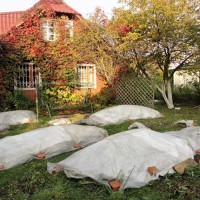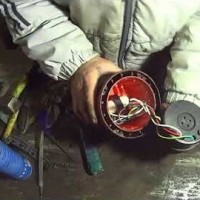What determines the service life of a gas boiler in a private home: what affects it + tips for extending life
Buying a gas heating boiler is not a cheap pleasure.When making such a purchase, you don’t want the said equipment to break down after just a couple of seasons, right? And such a nuisance can really be avoided if you have knowledge about the factors affecting the service life of a gas boiler in a private home. As well as information about the possibility of preventing premature breakdowns.
It is these issues that our article is devoted to, in which we examined in detail the factors that directly affect the service life of gas equipment. We supplemented the presented material with visual photographic materials and useful thematic videos.
The content of the article:
What determines the service life?
The service life of any gas boiler is traditionally influenced by a number of factors. Which it is advisable to take into account before purchasing equipment.
Let's take a closer look at the main points that affect durability:
- Type of gas boiler.
- Type of gas burner.
- Efficiency and functionality of electronics.
- Price category.
- Terms of Use.
- Incorrect commissioning.
- Poor quality installation of heating systems.
- Wrong choice of boilers.
In addition, each point contains a lot of significant nuances that should be dealt with in detail.
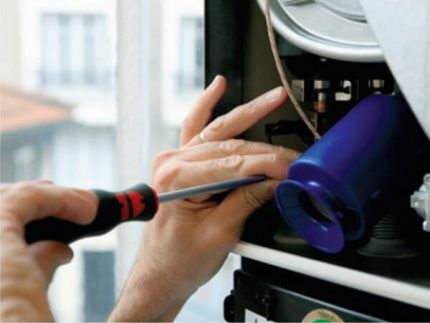
Factor #1 - heat exchanger material
Modern gas boilers are wall-mounted or floor-mounted. The first ones are compact and lightweight, so they are convenient to use in limited space. The second category of equipment is massive and large.
The features listed above are not just boiler characteristics, but factors that directly affect service life.
The reason is that developers are achieving lightness and compactness of mounted boilers by reducing the weight and dimensions of such an important design element as heat exchangers. As a result, the walls of the bodies of mounted models are thinner and prone to overheating, have less resistance to corrosion, and do not cope effectively with loads due to changes in coolant pressure.
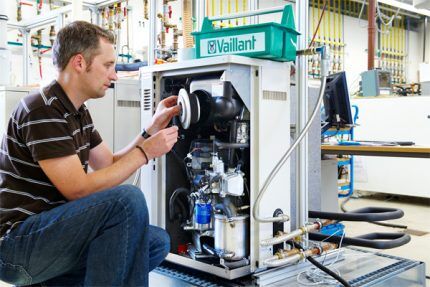
In addition, different materials are used for the manufacture of heat exchangers for both types of equipment. For example, for mounted boilers it is most often used copper - as the lightest metal of all suitable for these purposes.
And this is the only advantage, because the performance characteristics of this material are close to mediocre. As evidenced by its tendency to oxidize and not the best protective qualities against pressure changes and their consequences.
Quite often, floor-standing boilers (less often wall-mounted) are equipped with heat exchangers made of of stainless steel. But even with the same manufacturing material, the reliability of the design is not always the same - the walls of heat exchangers of ground-based products are usually much thicker, which extends the service life.
The most reliable metal used for the manufacture of heat exchangers is cast iron. It is resistant to corrosion, and if protected from significant pressure changes in the heating system and water hammerarising in this case, then the specified metal will provide the longest service life for heating boilers.
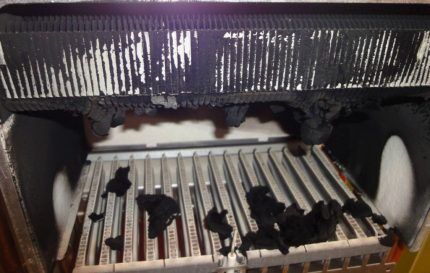
The listed features lead to the fact that the difference in service life can be impressive.
Factor #2 - type of gas burner
Thermal energy in boilers is generated by combustion of fuel. To ensure this procedure, gas-burning devices are used.
Namely the following varieties:
- atmospheric burner;
- forced air burner.
Boilers equipped with equipment of the first type have a shorter lifespan - atmospheric burner. The reason is the insufficient quality of combustion of the gas-air mixture. As a result, a large amount of soot remains, which is deposited on the surface of the heat exchanger, air ducts and other structural elements.
And if the boiler is not serviced in a timely manner, then after some time the layer of combustion products becomes sufficient to reduce the transfer of energy to the coolant. And the boiler, in order to perform the given modes, has to work more. Which leads to accelerated wear and subsequent breakdown.
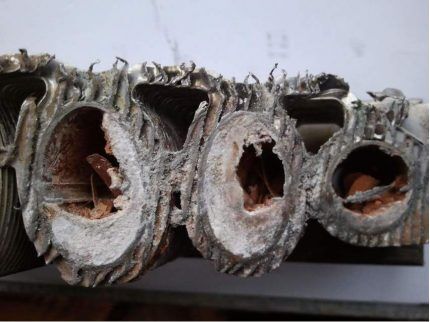
Boilers equipped with forced-air burners. Because a much larger amount of air is supplied here for fuel combustion.
This leads to its complete combustion, that is, a minimal amount of soot is formed. This means that the surfaces of the structural elements remain clean and the boiler does not need to solve the problem of heating the premises at the cost of wearing out its own parts.
Factor #3 - Electronic functionality
Today, the service life of modern gas boilers used in heating systems directly depends on their automation.
Because electronics performs the following functions:
- selects optimal operating modes, which reduces operating hours and loads;
- performs self-diagnosis;
- prevents emergency situations that often become causes of breakdowns (for example, overheating);
- protects circulation pumps from blocking.
Automation of a gas boiler allows you to perform a number of other important tasks. Which, ultimately, extends the service life, preventing breakdowns.
The more advanced the electronics, the more functions it performs. And the likelihood of errors and failures leading to negative consequences is lower.
Factor #4 - boiler price and brand
In the field of gas heating equipment, a well-known rule applies - cheap can't be good. Therefore, it is more likely that products from well-known European and Japanese brands will withstand many years of operation without breakdowns.
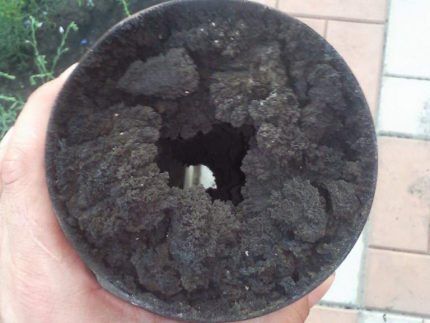
The reason is that the products of these manufacturers are designed to meet the stringent requirements of domestic markets. And high-quality materials are used in production. In addition, companies with a good reputation have established quality control, which reduces the number of non-compliant boilers leaving the plant.
Factor #5 - equipment operating conditions
The quality of the coolant has a significant impact on the service life. So, if the water is hard, highly acidic and contains various impurities and foreign particles, then there is no doubt that in a few years the heat exchanger channels will be clogged with scale or corroded by corrosion. Which will lead to early failure of the heating boiler.
Equally important to ensure longevity is the quantity and quality of air used to burn the gas. We discussed the reasons for this in detail above, in the paragraph “Type of gas burner”.
The main way to extend the service life is regular maintenance of boilers. This procedure requires special skills and tools, so not everyone can do the necessary work on their own. Preferably conclude a maintenance agreement with the gas company.
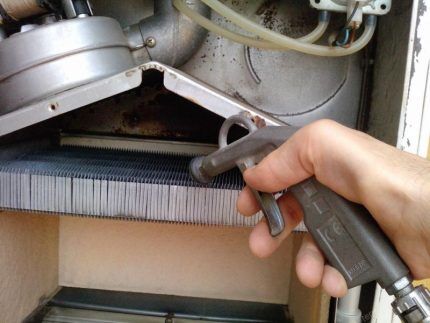
The following points can also lead to premature wear:
- increased humidity in the room where the heating boiler is installed;
- high/low temperatures, their differences.
Moreover, all of these factors actively influence durability, both during operation in cold weather and after the end of the heating season.
Factor #6 - errors during system installation
Poor installation of boilers leads to the fact that they do not operate at optimal conditions. Air often gets into the heat exchanger channels, and dust collects on the surfaces of the burners. Which leads to increased wear.
A common cause of boiler breakdowns is incorrect installation of radiators and other products with which heating equipment works.
Eg:
- Heating devices mounted at the wrong angle lead to heavy loads on the boilers. In addition, air appears in their channels, the presence of which leads to corrosion.
- Installed in the wrong place air vent will not work correctly. Which leads to airing of the system, and, consequently, to a decrease in its resource.
As a result, no matter how expensive and troublesome it may be, the shortcomings made during the installation of radiators and pipelines should be eliminated.
Factor #7 - wrong choice of boiler
Lack of productivity leads to increased loads on the heat exchanger, burner, pumps, which, in turn, leads to their subsequent wear.
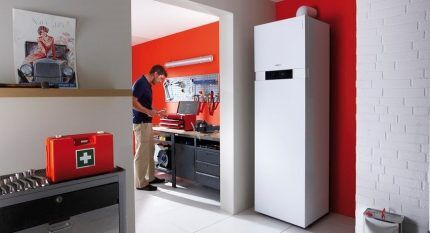
An equally problematic issue is excess power. Because of which boilers often turn on/off. And unsteady operating conditions are a direct path to premature wear.
We recommend that you read selection criteria the best gas boiler.
Recommendations for extending service life
To ensure that the standard service life of household gas boilers, established by the manufacturer, is not significantly reduced due to the problems listed in the article, it is necessary to perform a number of operations.
Firstly, even before purchasing the unit, you should determine its optimal power. The reserve should be 10-15%. That is, if a heating capacity of 13 kW is sufficient for heating, then it is more advisable to buy a boiler whose specified parameter will be around 15 kW.
Secondly, before connecting the unit, it is advisable perform an electrical check And heating systems. And, if shortcomings are identified in the form of pressure and voltage drops, then they should be eliminated. In addition, it is necessary to flush radiators and pipelines. And also take care of the availability grounding.
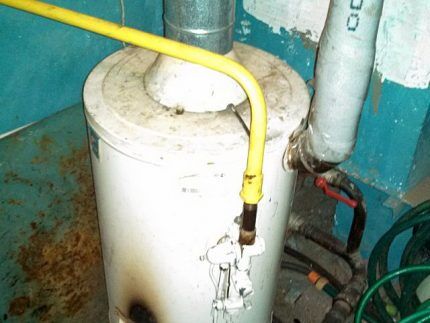
Thirdly, it is imperative to carry out checking the coolant. And, if the water is hard and contains impurities, then care must be taken to install filters in the system with a sufficient degree of purification, which can be coarse or fine. It is often necessary to use both types of equipment. Magnetic filters effectively remove metal particles.
Fourthly, you should not skimp on boiler installation, it must be performed by qualified specialists. From the moment of test start-up of the unit, to protect it, use Voltage regulator.
It is also advisable to use:
- uninterruptable power source — in the event of a power outage, this device will make it possible to eliminate the failure of the system;
- dielectric inserts - they will eliminate the interaction of electric current with gas and the consequences of this.
Fifthly, boilers are desirable use regularly. That is, do not turn them off when leaving for work or even for a long absence.
The service life of the boiler will be extended by using it in the off-season. Why do you need to choose the most economical mode?
Sixthly, do not neglect boiler maintenance - this is the most important measure to extend their service life. According to the governing documents, it must be performed before the start of each heating season. But it is better if the owners carry out the necessary procedures 2 or even 3 times a year.
And not formally, but with cleaning of boiler channels, pipelines, radiators, heat exchanger surfaces, burners.As well as replacing filters, checking the functionality of the mechanics and electronics of the units.
Seventhly, it should promptly respond to any warning signals electronics during operation.
Conclusions and useful video on the topic
The first video will help you understand how the boiler owner can influence the length of its service life:
The following video will give you the opportunity to learn more about what contributes to the longevity of a heating unit:
Many factors negatively affect the service life of boilers, including proper operation and regular maintenance.
Dealing with all factors is not always easy, and often costly. But you should remember the result - with proper use and care, gas equipment will serve for a long time and safely.
What methods do you use to extend the life of your gas boiler? Share your personal operating secrets and useful observations with other users - leave your comments in the block below the article.
If you have questions about extending the life of gas equipment, ask them in the feedback form - our experts and other site visitors will try to help you.
